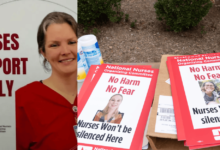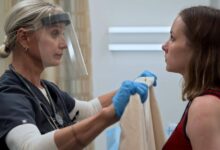Welsh Government told to tighten minimum nurse staffing laws

The Welsh Government must clarify sections of its safe nurse staffing laws and detail how it will fund the new nursing associate post, a new scrutiny document has said.
The calls come from the Welsh Parliament Health and Social Care Committee (HSCC), which scrutinises legislation on the NHS and health and social care in Wales.
The cross-party committee has published a series of recommendations to the government, surrounding the implementation of the Safer Staffing Levels (Wales) Act 2016.
“Many of the recommendations will help to improve patient safety”
Helen Whyley
This act sets out the duty that NHS Wales health boards have to make sure they have enough nurses to ensure safe patient care.
It has three key sections relating to these duties:
- Section 25A, a non-statutory duty for health boards to provide sufficient nurses
- Section 25B, a statutory requirement for health boards to safely staff adult acute medical and surgical wards and children’s wards
- Section 25C, a statutory requirement for health boards to use a specific method to calculate the nurse staffing level for any 25B-covered ward
The HSCC has requested that the Welsh Department of Health and Social Services better adhere to Section 25D, which asks it to issue statutory guidance to health boards on adherence to 25B and 25C.
It said the government must “clarify the consequences” for non-compliance with these two sections, including what would happen if an intervention had to happen.
The minister for health and social services was also advised to create “clear operational guidance” for the application of Section 25A, the non-legally binding duty to provide enough nurses for safe staffing.
The six-member HSCC said the minister should then report on progress made with this in the next six months.
In addition, the government was asked to commission research into the act, and into safe staffing in Wales compared to the rest of the UK.
Further, the HSCC called on the health minister to confirm that the introduction of registered nursing associates – which was recently announced – would be fully funded, where this funding will come from, and that they will not be used to substitute registered nurses.
The Royal College of Nursing (RCN) in Wales welcomed the recommendations and, in particular, said the request to identify the “full funding” of nursing associates in the country was “very helpful”.
RCN Wales has, since the 2016 act was put into law, repeatedly called for it to be widened, with duties in Section 25A to be made mandatory and the consequences for any non-compliance to be clarified.
The RCN also, in recent months, had aired worries about the prospect of nursing associates in Wales being used as a substitute for band 5 registered nurses.
Helen Whyley, RCN Wales executive director, said she was pleased to see recommendations in the report to this end and urged the government to heed them.
“RCN Wales members are rightly proud to have campaigned for this law which has done so much for patient safety,” said Ms Whyley. “Many of the recommendations will help to improve patient safety.
“Others will shed much-needed light on how successful efforts to retain nursing staff have been. All will help assure the public that the government is doing everything possible to ensure safe and effective care.”
However, in addition, Ms Whyley called on first minister Vaughan Gething to further extend to the safe staffig legislation to cover mental health and community settings.
“I also ask the first minister to ensure his government shows the same ambition for safe and effective care he showed when, as health minister in 2021, he extended Section 25B to children’s wards thus requiring the nurse staffing level on a children’s wards to be calculated using the same method as used for adult acute medical and surgical wards.
“Three years later, there’s been no further extension, despite the investment into work the Welsh Government has made. I am calling on the government to finish what’s been started and commit to a timeline to extend Section 25B into mental health wards and across community settings.”
Mr Gething, who became first minister for Wales in March this year, was minister for health and social services from 2016 to 2021.






